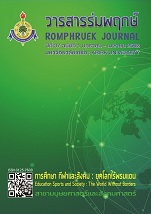Anti – corruption and multi-level of social collaboration
Main Article Content
Abstract
Anti-corruption task is characterized both as a special task for a specific case and a task that needs to collaborate closely with other social sectors.This article pays attention to finding the factors that lead to the success of multiple tasks simultaneously either under UN Global Impact or the Three Pronged Strategy of the anti-corruption organization initiated by the Independent Commission Against Corruption of Hong Kong.The results found that the success of anti- corruption agency both in the developed and the developing countries operate according to the Three Pronged Strategy which consists of law enforcement, prevention, and promoting public consciousness. The success was the results of the collaboration at the policy and the operation level, arranging the relationship between principle and practice, arranging the effective management both within the organization and with others organization, including creating learning amid the social reality.
Article Details
Every article published in the Romphruek Journal of the Humanities and Social Sciences is the opinion and point of view of the authors. Thery're not the viewpoint of Krirk University or the editored department. Any part or all of the articles for pablication must be clearly cited.
References
ฐากูร จุลินทร (ม.ป.ป.). การแก้ไขปัญหาการทุจริตผ่านบทเรียนของอินโดนีเซีย. (25 มกราคม 2562)
สืบค้นจาก http://www.parliament.go.th.
Banflied, E. (1985). Corruption as a feature of governmental organization Here the people
ruleselected essays. Washington D.C : The AEI Press.
Gobel, C. (2015). Anticorruption in Taiwan : process - tracing report German Institute of
Global and Area Studies. (February 7, 2019) Retrieved from https://www.researchgate.net.
Gonzalez-Perez, M.& Leonard, L. (2017). The UN Global Compact. In Jonge, A. & Tomasic, R.(Ed.),
Research handbook on transnational corporations. pp.117-138. (February 15, 2019) Retrieved from https://www.researchgate.net.
Gopalan, S. (2007). Shame sanctions and excessive CEO pay. (February 20,2019).
Retrieved from https://papers.ssrn.com.
Jin-wook, C. (2011). Measuring the performance of an anticorruption agency : The case of
the KPK in Indonesia. International Review of Public Administration, 16 (3), 45-63.
Kania, J. & Kramer, M. (2011). Collective impact. Retrieved from https://ssir.org.
Klitgaard, R. (1988). Controlling corruption. Berkley CA : University of California Press.
Levy,B. (n.d.). How Indonesia’s anti-corruption agency challenged the establishment and lived
to tell the tale. Jacob Thomases Comparative Public Management. (March 1, 2019) Retrieved from https://workingwiththegrain.files.wordpress.com.
Low, L., Lamoree, S.,& London, J. (2015). The demand side of transnational bribery and
corruption : Why leveling the playing field on supply side isn’t enough. Retrieved from https://ir.lawnet.fordham.edu.
Mok, W.H. (n.d.). Corruption prevention in public organizations – The Hong Kong experience.
(February 24, 2019) Retrieved from http://unpan1.
Netter, B. (2005). Avoiding the shameful backlash :social repercussions for the increased
use of alternative sanctions. Journal of Criminal Law and Criminology, 96 (1), 188-189.
Panth, S. (2011). Changing Norms is Key to Fighting Everyday Corruption. (March 1, 2019)
Retrieved from http://siteresources.worldbank.org.
Park,G. (n.d.). Korea’s policies and instruments to manage conflicts of interest. (February 8, 2019)
Retrieved from https://www.oecd.org.
Radcliffe-Brown, A. R. (1952). Structure and function in primitive society. Illinois : The Free Press.
Scot, I. (2017). The challenge of preserving Hong Kong’s successful anti-corruption system.
Asian Education and Development Studies, 6 (3), 227-237.
Shih, F. (2007). The red tide anti-corruption protest : What does it mean for democracy in
Taiwan?. Taiwan in Comparative, 1, 87-98.
Song, H. (2007). Anti-corruption policy implementation in Korea. (February 14, 2019)
Retrieved from https://www.nacf.org.za.
Stapenhurst, F., Karakas, F., Sarigöllü, E, Jo, M., & Draman, R . (2017). The supply and demand
sides of corruption : Canadian extractive companies in Africa.
Canadian Foreign Policy Journal, 23(1), 60-76. (DOI : 10.1080/11926422.2016.1250655)
Verboon, P. & Marius D. (2010). When de severe sanctions enhance compliance?
The role of procedural fairness. Journal of Economic Psychology, 32(1), 120 -130.
Whitmeyer, J. M. (2002). Elites and popular nationalism. Journal of Society, 53, 639-632.


